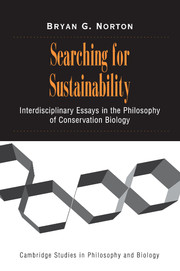Book contents
- Frontmatter
- Contents
- Searching for Sustainability
- General Introduction: An Interdisciplinary Experiment
- I PRAGMATISM AS AN ENVIRONMENTAL PHILOSOPHY
- II SCIENCE, POLICY, AND POLICY SCIENCE
- III ECONOMICS AND ENVIRONMENTAL SUSTAINABILITY
- IV SCALING SUSTAINABILITY: ECOLOGY AS IF HUMANS MATTERED
- V SOME ELEMENTS OF A PHILOSOPHY OF SUSTAINABLE LIVING
- VI VALUING SUSTAINABILITY: TOWARD A MORE COMPREHENSIVE APPROACH TO ENVIRONMENTAL EVALUATION
- 23 Commodity, Amenity, and Morality: The Limits of Quantification in Valuing Biodiversity
- 24 The Cultural Approach to Conservation Biology
- 25 Evaluation and Ecosystem Management: New Directions Needed?
- 26 What Do We Owe the Future? How Should We Decide?
- 27 Environmental Values and Adaptive Management, with Anne Steinemann
- Index
- References
23 - Commodity, Amenity, and Morality: The Limits of Quantification in Valuing Biodiversity
Published online by Cambridge University Press: 21 January 2010
- Frontmatter
- Contents
- Searching for Sustainability
- General Introduction: An Interdisciplinary Experiment
- I PRAGMATISM AS AN ENVIRONMENTAL PHILOSOPHY
- II SCIENCE, POLICY, AND POLICY SCIENCE
- III ECONOMICS AND ENVIRONMENTAL SUSTAINABILITY
- IV SCALING SUSTAINABILITY: ECOLOGY AS IF HUMANS MATTERED
- V SOME ELEMENTS OF A PHILOSOPHY OF SUSTAINABLE LIVING
- VI VALUING SUSTAINABILITY: TOWARD A MORE COMPREHENSIVE APPROACH TO ENVIRONMENTAL EVALUATION
- 23 Commodity, Amenity, and Morality: The Limits of Quantification in Valuing Biodiversity
- 24 The Cultural Approach to Conservation Biology
- 25 Evaluation and Ecosystem Management: New Directions Needed?
- 26 What Do We Owe the Future? How Should We Decide?
- 27 Environmental Values and Adaptive Management, with Anne Steinemann
- Index
- References
Summary
What is the value of the biological diversity of the planet? That question reminds me of a game we used to play at ice cream socials and church picnics when I was growing up in the Midwest. Someone on the entertainment committee would count an assortment of screws and gimcracks, or nuts and bolts, and put them into a mason jar. At the Christmas party, it was pecans, walnuts, and hickory nuts. Everybody else had to guess: How many whatchamacallits are in the jar?
Pretend we're having an ice cream social on an improved version of the space shuttle. Someone looks down and says, “What's the value of the life on that planet down there?” The closest guess wins a door prize.
But our question is tougher than nuts and bolts. Recently, scientists discovered bones from a dinosaur they have called seismosaurus. That animal was 18 feet tall, more than 100 feet long, and weighed 80 tons. The diversity in size between a seismosaurus and the smallest microbe is staggering. And I used to be thrown off when they put washers of two different sizes in the mason jar! Given the diversity in size among species, not to mention the fact that many species live inside others, it is not surprising that scientists have left themselves some latitude in their guesses as to how many species there are: they estimate that there are between 5 and 30 million species.
- Type
- Chapter
- Information
- Searching for SustainabilityInterdisciplinary Essays in the Philosophy of Conservation Biology, pp. 460 - 466Publisher: Cambridge University PressPrint publication year: 2002



